Recently I had a conversation with someone who wondered why anyone would homeschool now that on-line public schools are available. Wouldn't it be better to have an "official" education, knowing that the same things taught in a public school were covered? Considering that the government provides all materials - even a computer - and students can still avoid the negative peer environment many wish to escape, why would you choose a traditional homeschool?
There are distinct advantages to both on-line school and homeschool, and I'm thankful that families have more options. But there are still unique and distinct advantages to homeschooling. I remember a Bill of Rights I posted on our fridge about 15 years ago.
If a child loves to read, or to do art work, or to perform science experiments, these skills can be the foundation on which other areas of learning are built. School teachers do make some attempt to teaching towards different learning styles, but it is impossible to do so to the same extent as a homeschooling parent.
On the other hand, areas of weakness can be formally addressed: poor etiquette, delayed gross motor skills, fear of water, difficulty with reading etc. Any area that needs help can be given time and individualized instruction.
Most teachers value children and want the best for their students, no doubt. They may even be loving and caring. But it is a fact of life they won't like some of their students. Even the students that they like, or even love, cannot be loved as deeply as their parents love them.
Both parents and teachers are subject to losing their patience. But good parents know they have to go to their children, admit their wrong, and ask forgiveness. How blessed we are that children freely grant it.
Teachers, on the other hand, are seldom likely to apologize to a child who has received the brunt of their impatience. In all my years in school I never once saw it or heard of it.
Students benefit, indeed need, the right amount of time to learn certain concepts. The amount of time is individualized for each student.
It is a waste of a child's time to sit in a class learning and relearning math, reading, and writing concepts they already know. Endlessly filling out workbook pages does not improve their comprehension and dulls them to the learning process. If they were allowed to move ahead and stay on the cutting edge of their own information, the love of learning would remain active.
At the same time, students who need a little more time would not be left floundering as the class moves forward. This may occur because the concept is foreign or difficult for a particular student, because he or she missed a few days of school for illness, or because they need the concept explained from a different perspective. If they are expected to move forward before they are ready, significant gaps in their basic skills can occur. In additon, students lose confidence in their ability to learn.
As stated above, the students' strengths can be used to help them master areas of weakness. This creativity in teaching and learning can only occur with the one-on-one instruction of an individualized education.
We all have the arguments that say children need to live in the "real world." But in the REAL real world, we are not assigned a location and schedule with appointed peers that we have no control over. If I don't like my job or co-workers, I find a new job. If my neighbors are bothering me, I can move. If individuals in my social organizations don't treat me with respect, I will move on.
The only people who have no control over their peer groups and schedules are school kids and prisoners. Yes, that is the real world to some, but it isn't the real world free people live in.
What do you feel are the most valuable rights on a homeschooled child?
There are distinct advantages to both on-line school and homeschool, and I'm thankful that families have more options. But there are still unique and distinct advantages to homeschooling. I remember a Bill of Rights I posted on our fridge about 15 years ago.
Freedom to have an indivualized education based on my strengths and weaknesses.
This is one of the greatest strengths of homeschool. You can incorporate any subjects a child needs to spend more time on.If a child loves to read, or to do art work, or to perform science experiments, these skills can be the foundation on which other areas of learning are built. School teachers do make some attempt to teaching towards different learning styles, but it is impossible to do so to the same extent as a homeschooling parent.
On the other hand, areas of weakness can be formally addressed: poor etiquette, delayed gross motor skills, fear of water, difficulty with reading etc. Any area that needs help can be given time and individualized instruction.
Freedom to be taught by someone who loves and honors me.
This speaks volumes to the importance of being taught at home. Loving parents treasure their children. They are a gift of God and the greatest blessing of a lifetime.Most teachers value children and want the best for their students, no doubt. They may even be loving and caring. But it is a fact of life they won't like some of their students. Even the students that they like, or even love, cannot be loved as deeply as their parents love them.
Both parents and teachers are subject to losing their patience. But good parents know they have to go to their children, admit their wrong, and ask forgiveness. How blessed we are that children freely grant it.
Teachers, on the other hand, are seldom likely to apologize to a child who has received the brunt of their impatience. In all my years in school I never once saw it or heard of it.
Freedom to master important concepts without being rushed if I need more time or delayed if I have already mastered it.
This was always a cornerstone of homeschooling, but in today's environment with the Commmon Core, it is even more essential.Students benefit, indeed need, the right amount of time to learn certain concepts. The amount of time is individualized for each student.
It is a waste of a child's time to sit in a class learning and relearning math, reading, and writing concepts they already know. Endlessly filling out workbook pages does not improve their comprehension and dulls them to the learning process. If they were allowed to move ahead and stay on the cutting edge of their own information, the love of learning would remain active.
At the same time, students who need a little more time would not be left floundering as the class moves forward. This may occur because the concept is foreign or difficult for a particular student, because he or she missed a few days of school for illness, or because they need the concept explained from a different perspective. If they are expected to move forward before they are ready, significant gaps in their basic skills can occur. In additon, students lose confidence in their ability to learn.
Freedom to explore subjects and topics of my interest.
This freedom is closely connected to the one above. Students can use their time to learn about subjects that interest them. This strategy improves reading, improves writing, and heightens the interest in learning.As stated above, the students' strengths can be used to help them master areas of weakness. This creativity in teaching and learning can only occur with the one-on-one instruction of an individualized education.
Freedom to avoid harassment, bullying, or social ostracism.
Many families choose to homeschool to protect their children from a negative peer environmnent.We all have the arguments that say children need to live in the "real world." But in the REAL real world, we are not assigned a location and schedule with appointed peers that we have no control over. If I don't like my job or co-workers, I find a new job. If my neighbors are bothering me, I can move. If individuals in my social organizations don't treat me with respect, I will move on.
The only people who have no control over their peer groups and schedules are school kids and prisoners. Yes, that is the real world to some, but it isn't the real world free people live in.
What do you feel are the most valuable rights on a homeschooled child?
About Our Site
Hands-On Learning


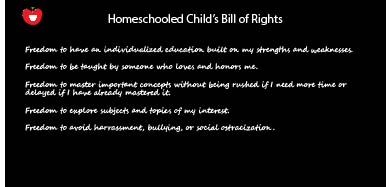




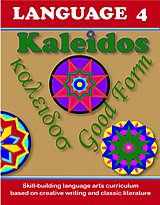
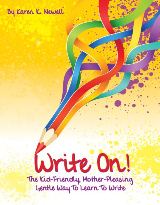

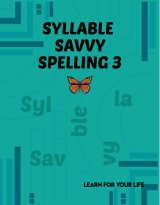

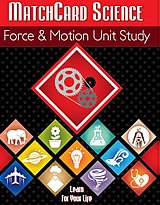


New! Comments
Share your feedback with the rest of the home school community.